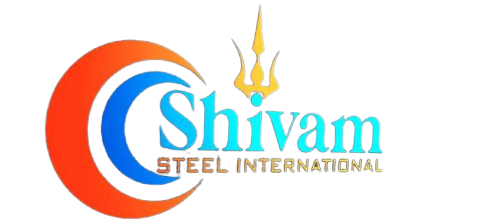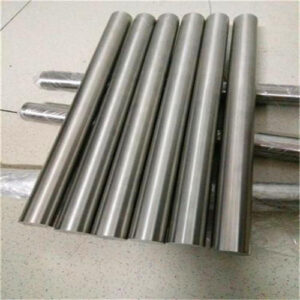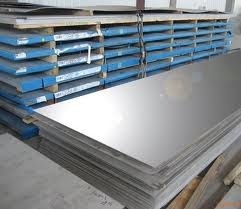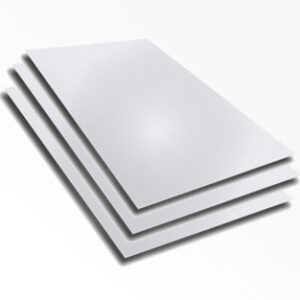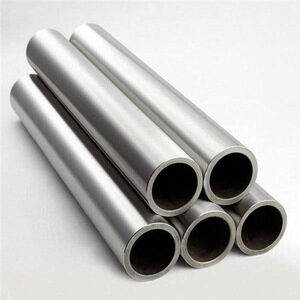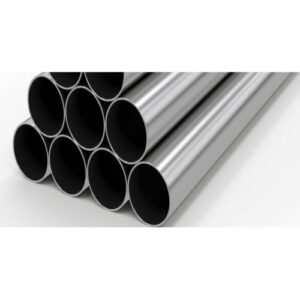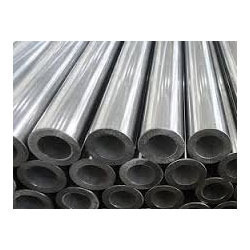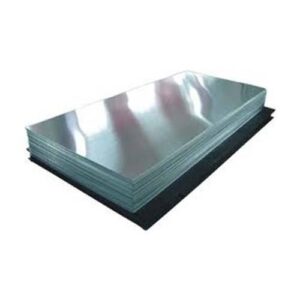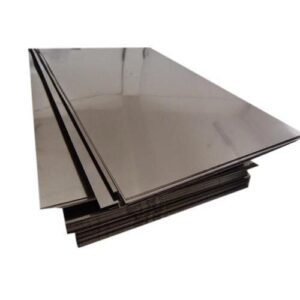Nimonic 80A Rod
NIMONIC® alloy 80A (UNS N07080/W. Nr. 2.4952 & 2.4631) is a wrought, age-hardenable nickel-chromium alloy, strengthened by additions of titanium, aluminum and carbon, developed for service at temperatures up to 815°C (1500°F). It is produced by high-frequency melting and casting in air for forms to be extruded. Electroslag refined material is used for forms to be forged. Vacuum refined versions are also available. NIMONIC alloy 80A is currently used for gas turbine components (blades, rings and discs), bolts, nuclear boiler tube supports, die casting inserts and cores, and for automobile exhaust valves. The alloy’s limiting chemical composition is given in Table 1 (as in British Standard HR1, 201, 401 and 601).
Nimonic 75 Rod
NIMONIC® alloy 75 (UNS N06075/W.Nr. 2.4951 & 2.4630) is an 80/20 nickel-chromium alloy with controlled additions of titanium and carbon. First introduced in the 1940s for turbine blades in the prototype Whittle jet engines, it is now mostly used for sheet applications calling for oxidation and scaling resistance coupled with medium strength at high operating temperatures. It is still used in gas turbine engineering and also for industrial thermal processing, furnace components and heat-treatment equipment. It is readily fabricated and welded. Some physical properties for NIMONIC alloy 75 are given in Tables 2-4. Thermal expansion data in Table 3 were determined on fully heat-treated material. The data are subject to a variation of approximately ±5% according to processing variables. The dynamic modulus data in Table 4 were obtained from fully heattreated cylindrical specimens vibrated in the flexural mode. The recommended heat treatments are quoted in the Heat Treatment section of this bulletin.
Nimonic 90 Plate
NIMONIC® alloy 90 (UNS N07090/W. Nr. 2.4632) is a wrought nickel-chromium-cobalt base alloy strengthened by additions of titanium and aluminum. It has been developed as an age-hardenable creepresisting alloy for service at temperatures up to 920°C (1688°F. The alloy is used for turbine blades, discs, forgings, ring sections and hot-working tools.
Nimonic 80A Plate
NIMONIC® alloy 80A (UNS N07080/W. Nr. 2.4952 & 2.4631) is a wrought, age-hardenable nickel-chromium alloy, strengthened by additions of titanium, aluminum and carbon, developed for service at temperatures up to 815°C (1500°F). It is produced by high-frequency melting and casting in air for forms to be extruded. Electroslag refined material is used for forms to be forged. Vacuum refined versions are also available. NIMONIC alloy 80A is currently used for gas turbine components (blades, rings and discs), bolts, nuclear boiler tube supports, die casting inserts and cores, and for automobile exhaust valves.
Providing you the best range of NIMONIC PLATES such as Nimonic 90 Plate, Nimonic 80a Plate and Nimonic 75 Plate with effective & timely delivery.
Nimonic 75 Plate
NIMONIC® alloy 80A (UNS N07080/W. Nr. 2.4952 & 2.4631) is a wrought, age-hardenable nickel-chromium alloy, strengthened by additions of titanium, aluminum and carbon, developed for service at temperatures up to 815°C (1500°F). It is produced by high-frequency melting and casting in air for forms to be extruded. Electroslag refined material is used for forms to be forged. Vacuum refined versions are also available. NIMONIC alloy 80A is currently used for gas turbine components (blades, rings and discs), bolts, nuclear boiler tube supports, die casting inserts and cores, and for automobile exhaust valves. The alloy’s limiting chemical composition is given in Table 1 (as in British Standard HR1, 201, 401 and 601).
Providing you the best range of NIMONIC PLATES such as Nimonic 90 Plate, Nimonic 80a Plate and Nimonic 75 Plate with effective & timely delivery.
Nimonic 90 Pipe
NIMONIC® alloy 90 (UNS N07090/W. Nr. 2.4632) is a wrought nickel-chromium-cobalt base alloy strengthened by additions of titanium and aluminum. It has been developed as an age-hardenable creepresisting alloy for service at temperatures up to 920°C (1688°F. The alloy is used for turbine blades, discs, forgings, ring sections and hot-working tools.
Nimonic 80A Pipe
NIMONIC® alloy 80A (UNS N07080/W. Nr. 2.4952 & 2.4631) is a wrought, age-hardenable nickel-chromium alloy, strengthened by additions of titanium, aluminum and carbon, developed for service at temperatures up to 815°C (1500°F). It is produced by high-frequency melting and casting in air for forms to be extruded. Electroslag refined material is used for forms to be forged. Vacuum refined versions are also available. NIMONIC alloy 80A is currently used for gas turbine components (blades, rings and discs), bolts, nuclear boiler tube supports, die casting inserts and cores, and for automobile exhaust valves. The alloy’s limiting chemical composition is given in Table 1 (as in British Standard HR1, 201, 401 and 601)
Nimonic 75 Pipe
NIMONIC® alloy 75 (UNS N06075/W.Nr. 2.4951 & 2.4630) is an 80/20 nickel-chromium alloy with controlled additions of titanium and carbon. First introduced in the 1940s for turbine blades in the prototype Whittle jet engines, it is now mostly used for sheet applications calling for oxidation and scaling resistance coupled with medium strength at high operating temperatures. It is still used in gas turbine engineering and also for industrial thermal processing, furnace components and heat-treatment equipment. It is readily fabricated and welded. Some physical properties for NIMONIC alloy 75 are given in Tables 2-4. Thermal expansion data in Table 3 were determined on fully heat-treated material. The data are subject to a variation of approximately ±5% according to processing variables. The dynamic modulus data in Table 4 were obtained from fully heattreated cylindrical specimens vibrated in the flexural mode. The recommended heat treatments are quoted in the Heat Treatment section of this bulletin.
Physical Properties Table 1 – Limiting
17-7PH Stainless Steel Sheet, Plate & Coil – AMS 5528, UNS S17700
17-7 PH is a precipitation-hardened stainless steel that is well suited for aerospace and other applications requiring high strength and good corrosion resistance and formability. Type 17-7PH is a Chromium-Nickel-Aluminum, austenitic stainless steel. It is the most formable of all PH grades and has the highest strength and hardness. It is less magnetic than other PH grades and offers minimal distortion upon heat treatment. This material maintains its valuable properties at temperatures up to 800° F (427° C).
17-4PH Stainless Steel Sheet, Coil and Plate – AMS 5604, UNS S17400
17-4 PH is a martensitic, chromium-nickel-copper precipitation-hardening stainless steel. 17-4 PH stainless steel is capable of attaining a wide range of strength and toughness properties depending on the precipitation or aging temperature used in hardening. Its valuable combination of high strength, good corrosion resistance and toughness in both base metals and welds gives designers opportunities to add reliability to their products while simplifying fabrication and often reducing costs. High strength is maintained to approximately 600°F (316°C). This material has good resistance to stress corrosion cracking in the lower strength conditions.
15-5 PH Stainless Steel Bar – AMS 5659
15-5 stainless steel is a martensitic, precipitation-hardening material with chromium, nickel and copper. It is often a first choice in the aerospace industry for fasteners and structural components. Its unique structure provides increased toughness and better corrosion resistance than its predecessor, 17-4 PH. Both inclusion control and a minimized amount of delta ferrite as compared to 17-4 stainless steel contribute to the greater toughness of 15-5. The alloy is further strengthened by a low temperature heat treatment which precipitates a copper containing phase in the alloy. 15-5 PH is able to meet the stringent mechanical properties required in the aerospace and nuclear industries.
Duranickel Alloy 301
Super alloys or high performance alloys include iron-based, cobalt-based and nickel-based alloys. These alloys contain good oxidation and creep resistance and are available in different shapes.
Super alloys can be strengthened by precipitation hardening, solid-solution hardening and work hardening methods. These alloys can function under high mechanical stress and high temperatures and also in places that require high surface stability.
Duranickel alloy 301 is an age-hardenable alloy and has greater hardness and strength in comparison with Nickel 200 alloy.
